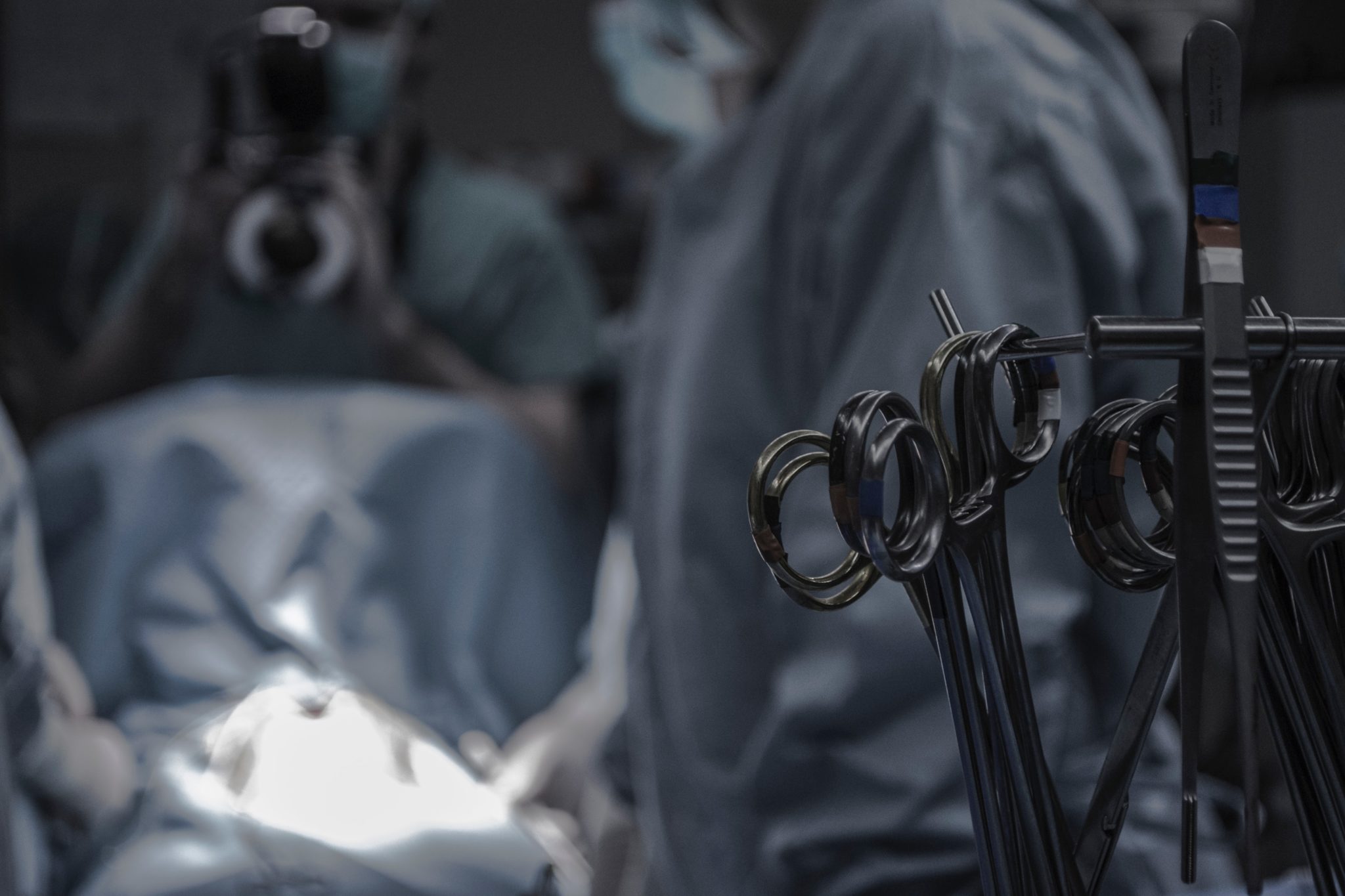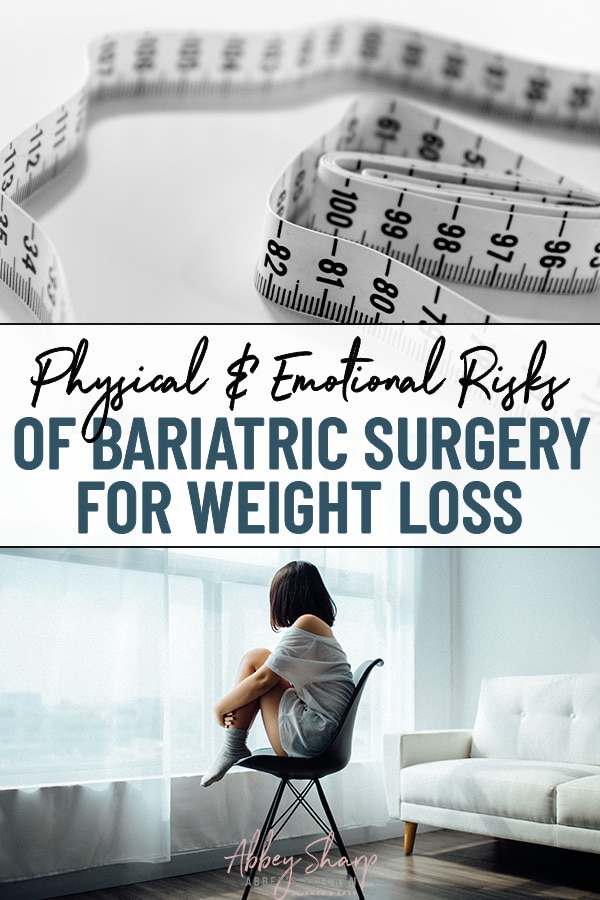In part two of this two part post, we will discuss bariatric surgery risks and benefits for one’s physical and mental health.
If you haven’t already, check out part one of this series where we discussed the weight loss surgery basics, from common procedures to the dietary and lifestyle changes that must be made before and after surgery.
Bariatric Surgery benefits
While bariatric surgery is an invasive and often permanent procedure, there’s a reason why it’s often performed. It results in rapid and significant weight loss – often for individuals who have not had success losing weight any other way, and for whom their weight impacts their health. Let’s begin by discussing some of the stated benefits of bariatric surgery.
Weight Loss benefits
Considering it’s main purpose is to help people reduce weight when they haven’t had success with other avenues, research has consistently shown that bariatric surgery is effective at helping patients lose 47-70% of excess weight. Having said that, research has also found that bariatric surgery doesn’t promise long term results, necessarily. One study found that excess weight loss in patients with a laparoscopic sleeve gastrectomy, for example, was at 77% after a year, it decreased to 56% after five years. Other research found the weight regain rate was 14.1% 5 years after a weight loss surgery, while another study found that only 40% of gastric bypass patients maintained at least 30% weight loss after 12 years. Clearly, this is not a perfect one and done procedure.
Meanwhile, we are also lacking high quality randomized controlled trials assessing the long term dangers and risks of these weight loss surgeries. Procedures like the Duodenal Switch and the RYGB have been shown to achieve greater excess weight loss because they both interfere with the absorption of nutrients in the small intestine. However, while these procedures may be more effective at weight loss, they also come at a cost of much higher complication rates.
Gut Health benefits
With significant changes to the digestive tract after surgery, it’s suggested that these alterations can affect the intestinal microbiota. Some early research suggests that weight loss surgery may repopulate the gut with new organisms that may actually promote weight loss. A study of lab mice found that the RYGB procedure was not only effective because it re-routes the digestive tract, but also by changing the bacteria in the gut. Researchers believe that RYGB might not only change the anatomy of the gut but also the metabolism or the endocrine system from its effectiveness on diabetes remission (we’ll mention this next). Research has found that after surgery, the gut microbiota of patients resembled the gut microbiota in lean people. In that lab mice study I just mentioned, researchers from Massachusetts General Hospital and Harvard University transferred the gut microbiota from RYGB mice to obese mice. Interestingly, the obese mice actually lost weight and fat with no surgery was required. This research is still in its infancy, but in the future this transferring of microbes would be way less invasive than weight loss surgeries. Having said that, we also don’t yet know the negative implications of changing the microbiome through surgery. There is a growing concern in the mental health profession that manipulating the gut may also sever some important connections in the gut-brain axis, which may be responsible for the increased risk of suicide and depression (more on that below). Clearly we need more research to better evaluate the risks and benefits of weight loss surgery to our gut.
Improvement in Glycemic Control
Some evidence has found that bariatric surgery is effective in controlling Type II Diabetes, reducing drug dependence for diabetes management and even remission. One study by Buchwald et al found that bariatric surgery achieved complete diabetes resolution in 76.8% of subjects. Several studies have reported early resolution of Type II diabetes one month after RYGB with metabolic improvements.
However, these results do depend on the type of surgery. Research has found that Lap Band surgery has resulted in 48% remission from diabetes, RYGB resulted in 84% remission and the Duodenal Switch resulted in 99% remission. Again, as with the weight loss outcomes, procedures that interfere with nutrient absorption were most effective at type II diabetes control.
Remission rates were also determined by a variety of other factors like shorter duration of diabetes, greater weight loss, use of oral medication for diabetes management and previous lifestyle modifications.
So how does the RYGB or the Duodenal Switch improve glycemic control? There are two theories.
Theory #1 for Glycemic Control: Foregut Hypothesis
According to one animal study involving the RYGB procedure, the bypass of the duodenal-jejunum led to glycemic improvement. In the study, the exclusion of the proximal intestine from nutrient flow greatly improved diabetes in rats. When nutrients bypass this part of the small intestine, it’s hypothesized that this may prevent the secretion of a signal that promotes insulin resistance and type II diabetes.
Theory #2 for Glycemic Control: Hindgut Hypothesis
The other theory is that the rapid delivery of nutrients to the distal small bowel enhances the physiologic signal that improves glucose metabolism. It’s theorized that this rapid process may exaggerate secretion of the gut hormone, GLP-1. GLP-1 enhances B-cell function which ultimately improves insulin sensitivity.
However, long term data shows a potential recurrence of hyperglycemia years after the procedure. So while it’s unclear if how many patients relapse because of a lack of long term studies, there is a significant percentage of patients that experience a relapse in diabetes. This is something we’ll have to keep an eye on in the future when we have more data.
Improvement in Cardiovascular Health
Bariatric surgery has been shown to resolve or improve cardiovascular risk factors like hypertension and dyslipidemia. A cohort study found a sustained decrease in blood pressure during a ten year follow up after surgery. Another study found that surgery produced a 41% reduction in serum triglycerides one year after RYGB, an increase in HDL cholesterol by 23% and a decrease in LDL cholesterol by 19%. These beneficial effects on a person’s cholesterol levels remained for up to two years, but as with other outcomes of bariatric surgery, we don’t know the long term outcomes. Since we don’t have a whole lot of long term research and follow up studies, we don’t know whether these benefits are sustained over time.
Improvement in Renal Health
Some observational studies have suggested that bariatric surgery may reduce long term kidney impairment associated with diabetes. One study followed patients over a five year period while measuring certain kidney biomarkers. Before surgery, 37.8% of patients had kidney conditions like microalbuminuria or macroalbuminuria. Five years later, after surgery, these kidney conditions resolved in 58.3% of patients. In another non-randomized study with fifty patients, kidney function was preserved over ten years in the Duodenal Switch group and function was decreased in the medically treated group (non-surgical group).
Decrease in Mortality
The major goal of bariatric surgery is to decrease the risk of early-mortality from obesity-related conditions. A meta-analysis including over 44,000 participants from eight trials found a reduced risk of global mortality after bariatric surgery compared with no surgery. The follow up range of these studies ranged from 2.5 to 12 years. Â Research has shown that weight loss surgery can reduce mortality in specific people and populations by as much as 30%.
To top it all off, a Canadian study compared surgical versus non-surgical treatment for morbid obesity, and found a reduction of the relative risk of death of 89% in surgery group during a five year follow up.
Bariatric Surgery Risks
While this may all sound really promising for people who are struggling with their weight, it’s important to note that this is NOT a risk free procedure. In fact, there is very much some real, serious issues with weight loss surgery that are often not well articulated in pamphlets or ads.
Medical risks with Bariatric Surgery
Infection
After surgery, there is always the risk of the cuts becoming infected while they’re healing. Surgeries like RYGB and Sleeve Gastrectomy can cause a leak from the stomach into the belly area. This type of infection is called peritonitis and occurs in approximately 3.2% of patients.
Gallstones
It’s common to develop gallstones in the first year or two after weight loss surgery (apparently the risk is as high as 52.8%). One explanation may be due to the reduced secretion of cholecystokinin (stimulates the release of bile to break down fat) which may be bypassed depending on the surgery performed. A Sleeve Gastrectomy is less likely to cause gallstones because the GI tract remains intact after surgery.
Gastric Band Slippage or Erosion
There’s a small risk that after Lap Band surgery, the band could slip out of place or erode in the stomach. Slippage occurs in 8% of patients and is the most common complication after gastric band surgery. Often patients report symptoms of vomiting after meals, feeling of fullness and pain or irritation in the upper abdomen as a result of the slippage, and that could be a chronic issue. Band erosion may also occur but it only happens in a small percentage of patients.
Nutritional risks with Bariatric Surgery
Malnutrition/Malabsorption
Depending on the procedure, some weight loss surgeries completely bypass a large portion of the small intestine making it impossible for your gut to absorb vitamins and minerals from food, and increasing the risk of malnutrition. Not getting enough vitamins and minerals could lead to certain deficiencies like anemia and osteoporosis. One study found that iron deficiency incidence was as high as 50% in premenopausal women after a gastric bypass surgery! In general, it’s not uncommon for patients to develop deficiencies in trace minerals like selenium, zinc and copper and vitamins like vitamin B12, B1, A, E, D and K. Protein deficiencies are also common in malabsorption weight loss surgeries. Although 50% of protein absorption happens in the duodenum, the remaining proteins are absorbed in the small intestine, which is likely bypassed after surgery. Protein deficiency has been reported in 7-21% of patients after undergoing a Duodenal Switch procedure because of the alteration in biliary and pancreatic function. Because of these risks, lifelong monitoring of these nutritional complications is necessary to avoid any long term issues.
Vomiting and Nausea
Emesis or vomiting, is a common symptom for bariatric patients after surgery. This can occur because of a variety of reasons. It may be due overeating or eating certain foods as patients adjust to the changes to their digestive tract function and size. In more serious cases, chronic vomiting may be caused by strictures, a small bowel obstruction or the gastric band from a Lap Band procedure being too tight.
Electrolyte Imbalance
A common metabolic complication of bariatric surgeries is electrolyte imbalance from low calcium, potassium, magnesium, sodium and phosphorus levels. This can lead to some serious health problems like myopathies (neuromuscular disorders) and arrhythmias (abnormal heartbeat). Like with vitamin and minerals, periodic monitoring of electrolytes is crucial to prevent metabolic complications.
Dumping Syndrome
Dumping syndrome can occur after surgery if foods or beverages enter the small intestine too quickly or in too large amounts because of the structural changes to the digestive tract. Some common symptoms include: sweating, nausea, vomiting, dizziness and diarrhea. To prevent dumping syndrome, patients are instructed to eat and drink slowly and keep their portion sizes very small.
Weight Gain or Re-Gain
If eating and psychiatric disorders are left untreated and are poorly addressed before surgery, it’s not uncommon for patients to actually gain weight post-op. Another cause of weight gain after surgery is surgery complications. The size of the stomach pouch may increase in size over time, so it is able to retain more food, resulting in an increased risk for weight gain. However there is also research that has found no difference in pouch size between a cohort of patients that lost weight and those that gained weight.
While we’ve seen the benefits of bariatric surgery in reducing gut hormones like ghrelin and improving insulin sensitivity, there are also cases where these hormonal changes did not occur. In one study, after RYGB the secretion of GIP and GLP-1 after eating was significant lower in patients with weight gain compared to patients that lost weight. GLP-1 responds after we eat by telling us we’re full to help promote fullness and satiety. So if it’s decreased, patients may not be aware that they’re full and eat more if GLP-1 is suppressed, leading to weight gain.
According to research from the journal, JAMA Surgery, researchers concluded that after five years, nearly half of patients experienced significant weight gain after a sleeve gastrectomy procedure. In a recent long term study, researchers found that after 12 years of undergoing the RYGB procedure, 93% of patients maintained at least 10% weight loss from base line, 70% maintained at least 20% weight loss and only 40% maintained at least 30% weight loss.
Mental Health Risks of bariatric surgery
Eating Disorders
Eating disorders are common among bariatric surgery patients and may emerge pre or post-surgery and even compromise surgery outcomes. The incidence of binge eating disorder has been estimated to be as high as 69% in bariatric patients and night eating syndrome is present in as many as 42%. These numbers are truly shocking. While many patients report vomiting after eating as a result of overeating or not being able to tolerate the food, there’s also a percentage of patients that are vomiting to control their weight and/or shape. Some researchers have suggested that the common gastrointestinal symptoms (like vomiting) may help facilitate or perpetuate the development of eating disorder behaviours.
Eating disorders among bariatric patients is a new area of study and many researchers are labelling it as a new eating disorder known as “post-surgical eating avoidance disorder”. At the same time, it can be difficult to classify certain behaviours as disordered because some behaviours and symptoms are normalized after bariatric surgery discomfort (ie. vomiting, constipation and decreased appetite.) A patient may resort to a disorderly behaviour to relieve discomfort because they’ve eaten too much or are not tolerating the food. They’re also instructed to limit their meal size, follow strict schedules, weigh their food and avoid specific foods. While these may be important post-surgery instructions to avoid complications, they very quickly can become dangerous and disorderly.
Substance Abuse and Addiction Transfer
After surgery, most bariatric patients are given some sort of opioid to help manage the pain. This is concerning, because research has found that bariatric patients are developing chronic opioid use leading to addiction. Often times, pre-bariatric patients are chronic opioid users, but research has found that their chronic use may increase after surgery. This 2013 study including 11719 patients found that pre-surgery patients continued their chronic opioid use after surgery and that their daily dosages actually increased from 45mg (preoperatively) to 52mg (postoperatively).
Aside from opioid use, research has found that patients are more prone to alcohol abuse and use this addiction as a substitute for their emotional eating. This is known as “Addiction Transfer”. Since a bariatric patient can’t use food as a coping mechanism without getting very sick, they instead turn to drugs and/or alcohol to comfort them. In a 2015 study, 18.4% of patients developed alcohol use disorder within three years after their weight loss surgery (RYGB).
Another reason alcohol abuse is common among bariatric patients is that with the new structural changes made to their stomach and digestive system as a whole, alcohol is more easily absorbed. In one study, 84% of patients who consumed alcohol after bariatric surgery experienced intoxicating effects after consuming a small amount and 29% of that group reported that the effects of alcohol lasted longer than they experienced before bariatric surgery.
Depression and Suicide
Before surgery even takes place, bariatric candidates already have a history of depression or other mental illnesses. They’ve likely been exposed to bullying and fat shaming, leading to disordered eating and substance abuse. So even after surgery, these issues are still present, which is why depression rates are so high and why many still need drugs and/or alcohol to cope. According to a study from Yale University, about 13% of bariatric surgery patients experience an increase in depression.
In a large 2016 study, researchers found that patients who had undergone RYGB were three times more likely to attempt suicide than the general population. When compared to the World Health Organization’s (WHO) suicide rates for the general population, researchers found a four-fold increased risk of death by suicide among bariatric surgery patients.
So why are patients at an increased risk of self-harm or suicide? Here are some possible reasons:
- Preoperative suicide behaviour
- Depression
- Recurrence of comorbid diseases
- Inability to lose weight
- New or re-emerging eating disorders
- Weight regain
- Unrealistic expectations
- Decrease quality of life
- New or re-emerging alcohol/substance use
- Physical mobility restrictions
- Sexual dysfunction
- Low self-esteem
- Relationship problems.
Clearly, there are a ton of reasons why and based on these alarming numbers on suicide rates and mental illnesses, and I worry that these statistics are not communicated effectively to bariatric surgery candidates.
How to Minimize Weight Loss Surgery Risks
In order to minimize some of these risks, here are a few recommendations that have been made to bariatric teams:
Include a Behavioural Health Professional on your team
It’s important to have a professional who has experience in treating internalized weight stigma. These experts can conduct suicide assessments, recognize the signs and develop a plan to help that patient.
Communicate the risks, benefits and possible side effects
When listing all the benefits of bariatric surgery, it’s also the responsibility of the surgeon and bariatric team to clearly point out to the patient the serious risks associated with this type of surgery. Patient education is so crucial, so that the patient understands all the risks and has the option to opt out if necessary.
Minimize Weight Bias
The healthcare system is not immune to weight bias. It is EVERYWHERE and it is rampant, particularly within the bariatric community. Some clinicians aren’t even aware of their bias which can only harm the patient. Instead of focusing on a patient’s appearance or number on the scale, we need to shift towards a more weight-inclusive perspective that focuses on how a patient is feeling and functioning.
Bottom Line on Bariatric Surgery Risks and Benefits
A ton of research has shown that bariatric surgery is an effective option for some individuals by increasing weight loss, improving and/or treating medical conditions and even promoting good gut health. However, it is not a benign or easy procedure. There are many cases where bariatric surgery may cause major complications and nutritional dangers. Not to mention, we do not even know how well the benefits of weight loss surgery will necessarily last.
Weight loss surgery is a stomach surgery, not a brain surgery, so if the underlying health concerns related to eating and food are not addressed before surgery, the risks very well may not outweigh the benefits of a smaller body.
What are your thoughts? Have you read our part one of this weight loss surgery post where we break down the typical pre and post-op diet?
Contribution By: Sofia Tsalamlal, RD
Updated on October 4th, 2021

Abbey Sharp is a Registered Dietitian (RD), regulated by the Ontario College of Dietitians. She is a mom, YouTuber, Blogger, award winning cookbook author, media coach specializing in food and nutrition influencers, and a frequent contributor to national publications like Healthline and on national broadcast TV shows.












Allegra Mattel says
Hi Abbey! I really appreciate what you are doing. I have been following your YouTube channel for a little while now and have been really inspired! However, I do have a question if I may. How can someone eat intuitively when they are have increased health risks? Meaning, for example, I just got my physical and I’m 0.1 away from pre-diabetes and my LDL and pressure are just barely below the high threshold. As I started implementing the intuitive eating principles I found myself eating terrible at first but then over time not craving “bad” foods as much as well as learning my hunger/fullness cues and not binging as much. Which I was really excited about! However I’m now nervous knowing that I’m so close to having multiple health issues. I know it takes time to learn to eat a healthy well balanced diet intuitively. But now I’m scared to continue to do so because I feel that I no longer have the time without risking serious health issues. I really would appreciate any advice. I appreciate how body positive you are and your emphasis on health not looks or numbers. I didn’t think health professionals like you existed and I’m so thankful for your inspiration Thank you so much!
Abbey Sharp says
great question. This does take time and you do have to trust the process. Research shows that restriction and yo yo dieting is MUCH more dangerous for your health than just staying the weight you are. And overtime, with intuitive eating, your weight will reach its natural set point (which may be lower than where you are if you have been yo yo dieting).